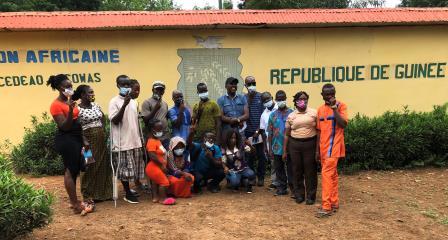MONROVIA, LIBERIA – A countrywide cross border dialogue on conflict legacies, gender-based violence, disease prevention, social cohesion, and sustainable livelihoods undertaken by Platform for Dialogue and Peace (P4DP), in collaboration with the University of St. Andrews in the United Kingdom, has been concluded.
The dialogue and community engagement with a cross section of participants from border communities in Liberia, were simultaneously held at four of Liberia border points with its neighboring countries, Sierra Leone, Guinea, and Cote d’Ivoire in the Mano River basin.
The cross border engagements were attended by participants of diverse backgrounds and interests, representing the youth; commercial motorcyclists; women in cross border trade; border post health and security personnel; and local community leaders.
The four border points included Bo Waterside, Voinjama, Ganta, and Toe Town while border communities of Kambia District in Sierra Leone and Danane in Cote d’Ivoire are other main points of focus being handled by other partnering counterparts of P4DP in the sub-region.
With a grant from the Scottish Funding Council, P4DP has been partnering with the University of St. Andrews to implement a cross-border dialogue and engagement aimed at examining the main challenges and vulnerabilities facing young people in cross-border communities of Liberia, Sierra Leone, Guinea and Cote d’Ivoire with emphasis on conflict legacies, gender-based violence, disease prevention, social cohesion, and sustainable livelihoods.
The border communities were selected because they were flash points of violence during the devastating civil wars across the region. Undoubtedly, border communities continue to be high risk locations for trafficking of humans, arms, and drugs, and other organized criminalities with the Corona virus pandemic bringing about new challenges to the fragile cross-border areas.
The dialogue and engagements were configured into various components, including (1) structured training, (2) horizontal structured mediation, (3) vertical structured mediation, and (4) focus group discussions and interviews.
The structured training which focused on conflict resolution targeted young people in each dialogue location, while the horizontal structured mediation ensured that the youth participants exclusively interacted with one another on dialogue and mediation, emphasizing conflict legacies, gender-based violence, disease prevention, social cohesion, and sustainable livelihoods. The vertical structured mediation component, on the other hand, brought together face to face the youth participants and other stakeholders such as border security, health workers and local community leaders.
At separate dialogue and engagement locations, participants applauded P4DP and the University for creating an opportunity that brought together stakeholders of diverse interests and experience to dialogue on issues vital to cross border and peacebuilding in the Mano River basin. They were unanimous in their discourse, strongly reiterating the views that although the civil wars in the region have ended and the guns are silent, violence has still been perceived by most young people as an acceptable way to seeking redress.
At the Toe Town sessions, for instance, acting district commissioner John K. Dennis, in particular, stressed that “peace-making in border communities that have been immediate victims of conflicts and violence caused by cross border activities should be given attention by all stakeholders, whether youth, women, border security, local authorities, or traditional & religious bodies. We all stand at risk and as such we need to work together in preventing conflicts and violence and in sustaining peace because Liberia and the sub-region are still in difficult situations.” Participants however lamented the use of unofficial border paths by some cross border traders and travelers, something which has often posed threats to their security.
At the Bo Waterside discussion point, a participant who asked not to be named mentioned a case of a Liberian cross border female trader arrested in 2020 for use of unofficial border path and raped with all of her belongings stolen.
Local authorities and security personnel acknowledged the occurrence of this incident which, according to them, was raised and discussed in one of their security coordination meetings, but contended that because they do not have adequate personnel to effectively man the entire border, they only hear these stories when they have already happened and perpetrators fled.
The participants at the various sessions made several recommendations which, among others, included conducting training and awareness for cross border traders on laws and regulations governing cross border trade and movements within the Mano River basin; promoting continuous dialogues with youth and other stakeholders (border security, traditional and local authorities, market women, motorcyclists, etc.) to ease movement and enhance trade and social cohesion; empowerment of young people to increase and strengthen their decision-making capacity in regard to their civic responsibilities, including avoiding participation in illegal activities; and reopening of the borders that were closed due to the outbreak of COVID-19.
These recommendations, the participants believed, would help to inculcate a new, positive thinking in key cross-border actors as a means of promoting cross border trade and by extension fostering peace, peacebuilding, disease prevention and social cohesion in the region.
Platform for Dialogue and Peace is a research, peacebuilding and development-oriented NGO that works with state and non-state actors to promote a safe, peaceful and integrated Liberian society by using evidence-based research and participatory action activities in both urban and rural communities. It can be recalled that in in October 2013, P4DP actively participated and co facilitated a quadripartite meeting chaired by former Minister Morris M. Dukuly of Internal Affairs and his Ivorian counterpart.
The four-day conference was aimed at bringing traditional chiefs and elders living along the frontiers together to find solutions to the border crisis. The conference was later climaxed by former President Ellen Johnson Sirleaf and her counterpart, President Allassane Quattara of Cote d’lviore, through a joint communiqué that reinforced peace and stability in the region.
Coincidently, Liberia is currently hosting two day Defense Ministers and Joint Chiefs of Defense Staff of the Mano River Union (MRU) member states brainstorming ways to address the prevailing security threats in the subregion considering the impact of coronavirus, growing terrorism threats and other cross – border criminal activities.

